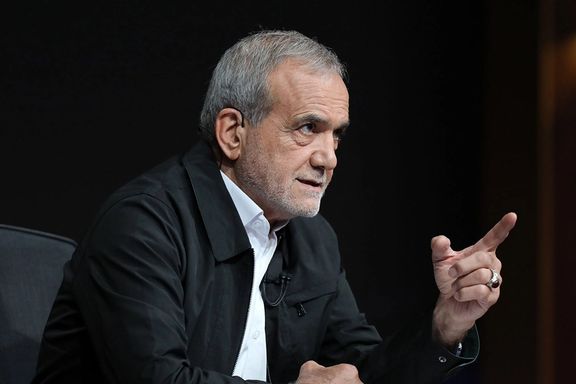In remarks that some netizens labeled as racist and misogynistic, Pezeshkian recounted: "We arrived, and a woman approached us. Our appearances contrasted with those around us, as we had traveled to the East, to Thailand, for management training."
He continued, "To be honest, we felt quite offended. There we were, nine university presidents in Thailand, being instructed on leadership. We led a revolution with aspirations to change the world, and yet they sent us here. To make matters worse, a woman—of short stature, no less—was expected to tell us what to do."
During the farewell and introduction ceremony for the outgoing and incoming ministers of Science, Research, and Technology—an event aired live on state television (IRIB)—Pezeshkian, in a disparaging tone, recounted that the woman assigned to train them had reacted to the large number of universities in Iran with a curious remark:
In what appeared to be a reference to the abundance of universities in Iran, the instructor asked Pezeshkian, "Are you planning to eat your own students?" She explained that economics addresses four key questions: What to produce, at what quality, in what quantity, and where to distribute it. She added, "We have failed to answer these four questions properly."
His speech caused a backlash on social media. One user, sarcastically referring to violence by security forces against students told Pezeshkian: "You should have told her, 'No, we want to imprison and torture them [the students], and then claim they committed suicide by hitting themselves with a hard object."
Another user wrote on X: "this speech hints at a comparison between Pezeshkian and Raisi; an educated fool is more foolish than an uneducated one."
"Because the instructor was a woman and short, he was offended. Of course, it’s not surprising that someone whose mindset is shaped by Nahj al-Balagha [Shiite religious book] would have such a view of a 'short woman.' His leader has said that women are deficient in intellect. Naturally, the shorter ones must be even more deficient in intelligence!" wrote a critic on social media.
Since the presidential campaign, Pezeshkian's frequent references in Arabic to Nahj al-Balagha—a centuries-old compilation of sermons often perceived as misogynistic—have drawn considerable scrutiny.
Pezeshkian has consistently expressed a disregard for formal protocols, openly admitting his reluctance to adhere to prepared scripts. He has come across as an unusual Islamic Republic politician who makes off-the-cuff candid remarks.
While his supporters interpret these actions as evidence of "simplicity, authenticity, and being of the people," they are likely to provoke more controversy.
However, in the role of President, Pezeshkian's remarks concerning citizens of foreign countries could carry significant diplomatic consequences.
With the United Nations General Assembly's annual meeting less than a month away, he is poised to deliver a speech and likely engage in additional interviews on the sidelines.







